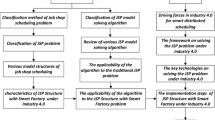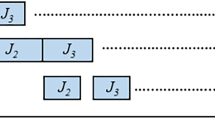Abstract
Current struggles for customer satisfaction in make-to-order companies focus on product customization and on-time delivery. For better management of demand-mix variability, production activities are typically configured as flexible job shops. The advent of information technology and process automatization has given rise to very specific training requirement for workers, which indeed turns production scheduling into a dual-resource constrained problem. This paper states a novel dual-resource constrained flexible job-shop problem (DRCFJSP) whose performance considers simultaneously makespan and due date-oriented criteria, where eligibility and processing time are both dependent on worker expertise. Our research comes from an automobile collision repair shop with re-scheduling needs to react to real-time events like due date changes, delay in arrival, changes in job processing time and rush jobs. We have developed constructive iterated greedy procedures that performs efficiently on the large-scale bi-objective DRCFJSP arisen (good schedules in < 5 s), hence providing planners with the required responsiveness in their scheduling of repairing orders and allocation of workers at the different work centres. In addition, computational experiments were conducted on a test bed of smaller DRCFJSP instances generated for benchmarking purposes. Off-the-shelf resolution for an 80% of the medium-sized instances is not fruitful after 9000 s.








Similar content being viewed by others
References
Adibi, M. A., Zandieh, M., & Amiri, M. (2010). Multi-objective scheduling of dynamic job shop using variable neighborhood search. Expert Systems with Applications,37(1), 282–287.
Agnetis, A., Murgia, G., & Sbrilli, S. (2014). A job shop scheduling problem with human operators in handicraft production. International Journal of Production Research,52(13), 3820–3831.
Al-Hinai, N., & Elmekkawy, T. Y. (2011). Robust and stable flexible job shop scheduling with random machine breakdowns using a hybrid genetic algorithm. International Journal of Production Economics,132(2), 279–291.
Allahverdi, A., Ng, C. T., Cheng, T. C. E., & Kovalyov, M. Y. (2008). A survey of scheduling problems with setup times or costs. European Journal of Operational Research,187(3), 985–1032.
Bagheri, A., & Zandieh, M. (2011). Bi-criteria flexible job-shop scheduling with sequence-dependent setup times—Variable neighborhood search approach. Journal of Manufacturing Systems,30, 8–15.
Birgin, E. G., Feofiloff, P., Fernandes, C. G., de Melo, E. L., Oshiro, M. T. I., & Ronconi, D. P. (2014). A MILP model for an extended version of the Flexible Job Shop Problem. Optimization Letters,8, 1417–1431.
Birgin, E. G., Ferreira, J. E., & Ronconi, D. P. (2015). List scheduling and beam search methods for the flexible job shop scheduling problem with sequencing flexibility. European Journal of Operational Research,247, 421–440.
Blazewicz, J., Pesch, E., & Sterna, M. (2000). The disjunctive graph machine representation of the job shop scheduling problem. European Journal of Operational Research,127, 317–331.
Brandimarte, P. (1993). Routing and scheduling in a flexible job shop by tabu search. Annals of Operations Research,41, 157–183.
Calleja, G., & Pastor, R. (2014). A dispatching algorithm for flexible job-shop scheduling with transfer batches: An industrial application. Production Planning & Control,25(2), 93–109.
Chaudhry, I. A., & Khan, A. A. (2016). A research survey: Review of flexible job shop scheduling techniques. International Transactions in Operational Research,23(3), 551–591.
Chen, Z. L. (2004). Simultaneous job scheduling and resource allocation on parallel machines. Annals of Operations Research,129(1–4), 135–153.
Chen, J. C., Wu, C.-C., Chen, C. W., & Chen, K. H. (2012). Flexible job shop scheduling with parallel machines using genetic algorithm and grouping genetic algorithm. Expert Systems with Applications,39(11), 10016–10021.
Chiang, T. C., & Fu, L. C. (2009). Using a family of critical ratio-based approaches to minimize the number of tardy jobs in the job shop with sequence dependent setup times. European Journal of Operational Research,196(1), 78–92.
Dauzère-pérès, S., & Paulli, J. (1997). An integrated approach for modeling and solving the general multiprocessor job-shop scheduling problem using tabu search. Annals of Operations Research,70, 281–306.
Demir, Y., & İşleyen, S. K. (2013). Evaluation of mathematical models for flexible job-shop scheduling problems. Applied Mathematical Modelling,37, 977–988.
Fattahi, P., Saidi Mehrabad, M., & Jolai, F. (2007). Mathematical modeling and heuristic approaches to flexible job shop scheduling problems. Journal of Intelligent Manufacturing,18, 331–342.
Frutos, M., Olivera, A. C., & Tohmé, F. (2010). A memetic algorithm based on a NSGAII scheme for the flexible job-shop scheduling problem. Annals of Operations Research,181(1), 745–765.
Gao, J., Gen, M., Sun, L., & Zhao, X. (2007). A hybrid of genetic algorithm and bottleneck shifting for multiobjective flexible job shop scheduling problems. Computers & Industrial Engineering,53(1), 149–162.
Gholami, M., & Zandieh, M. (2009). Integrating simulation and genetic algorithm to schedule a dynamic flexible job shop. Journal of Intelligent Manufacturing,20, 481–498.
Guyon, O., Lemaire, P., Pinson, É., & Rivreau, D. (2014). Solving an integrated job-shop problem with human resource constraints. Annals of Operations Research,213(1), 147–171.
Harjunkoski, I., Maravelias, C. T., Bongers, P., Castro, P. M., Engell, S., Grossmann, I. E., et al. (2014). Scope for industrial applications of production scheduling models and solution methods. Computers & Chemical Engineering,62, 161–193.
Hastings, N. A. J., & Yeh, C. H. (1990). Job oriented production scheduling. European Journal of Operational Research,47(1), 35–48.
Hmida, A. B., Haouari, M., Huguet, M.-J., & Lopez, P. (2010). Discrepancy search for the flexible job shop scheduling problem. Computers & Operations Research,37, 2192–2201.
Ho, N. B., Tay, J. C., & Lai, E. M. K. (2007). An effective architecture for learning and evolving flexible job-shop schedules. European Journal of Operational Research,179(2), 316–333.
Jayamohan, M. S., & Rajendran, C. (2000). New dispatching rules for shop scheduling: A step forward. International Journal of Production Research, 38(3), 563–586.
Ku, W.-Y., & Beck, J. C. (2016). Mixed Integer Programming models for job shop scheduling: A computational analysis. Computers & Operations Research,73, 165–173.
Lei, D., & Guo, X. (2014). Variable neighbourhood search for dual-resource constrained flexible job shop scheduling. International Journal of Production Research,52(9), 2519–2529.
Lei, D., & Guo, X. (2015). An effective neighborhood search for scheduling in dual-resource constrained interval job shop with environmental objective. International Journal of Production Economics,159, 296–303.
Li, X., & Gao, L. (2016). An effective hybrid genetic algorithm and tabu search for flexible job shop scheduling problem. International Journal of Production Economics,174, 93–110.
Liu, C., Yang, N., Li, W., Lian, J., Evans, S., & Yin, Y. (2013). Training and assignment of multi-skilled workers for implementing seru production systems. International Journal of Advanced Manufacturing Technology,69(5–8), 937–959.
Loukil, T., Teghem, J., & Fortemps, P. (2007). A multi-objective production scheduling case study solved by simulated annealing. European Journal of Operational Research,179(3), 709–722.
Mati, Y., Lahlou, C., & Dauzère-Pérès, S. (2011). Modelling and solving a practical flexible job-shop scheduling problem with blocking constraints. International Journal of Production Research,49(8), 2169–2182.
Mencía, R., Sierra, M. R., Mencía, C., & Varela, R. (2011). Genetic algorithm for job-shop scheduling with operators. In Proceedings of international work-conference on the interplay between natural and artificial computation IWINAC 2011(2) (pp. 305–314). Berlin: Springer.
Mousakhani, M. (2013). Sequence-dependent setup time flexible job shop scheduling problem to minimise total tardiness. International Journal of Production Research,51(12), 3476–3487.
Olivella, J., & Nembhard, D. (2016). Calibrating cross-training to meet demand mix variation and employee absence. European Journal of Operational Research,248(2), 462–472.
Ouelhadj, D., & Petrovic, S. (2009). A survey of dynamic scheduling in manufacturing systems. Journal of Scheduling,12(4), 417–431.
Özgüven, C., Özbakir, L., & Yavuz, Y. (2010). Mathematical models for job-shop scheduling problems with routing and process plan flexibility. Applied Mathematical Modelling,34(6), 1539–1548.
Özgüven, C., Yavuz, Y., & Üzbakir, L. (2012). Mixed integer goal programming models for the flexible job-shop scheduling problems with separable and non-separable sequence dependent setup times. Applied Mathematical Modelling,36(2), 846–858.
Rahmani, D., & Ramezanian, R. (2016). A stable reactive approach in dynamic flexible flow shop scheduling with unexpected disruptions: A case study. Computers & Industrial Engineering,98, 360–372.
Ruiz-Torres, A. J., Ablanedo-Rosas, J. H., & Otero, L. D. (2012). Scheduling with multiple tasks per job—The case of quality control laboratories in the pharmaceutical industry. International Journal of Production Research,50(3), 37–41.
Sabuncuoglu, I., & Comlekci, A. (2002). Operation based flow time estimation in a dynamic shop. Omega,30(6), 423–442.
Sierra, M. R., Mencía, C., & Varela, R. (2015). New schedule generation schemes for the job-shop problem with operators. Journal of Intelligent Manufacturing,26, 511–525.
Sobeyko, O., & Mönch, L. (2016). Heuristic approaches for scheduling jobs in large-scale flexible job shops. Computers & Operations Research,68, 97–109.
Sterna, M. (2011). A survey of scheduling problems with late work criteria. Omega,39(2), 120–129.
Sun, K., Yang, G.-K., & Bai, J. (2011). A mathematical model and solution for cost-driven job-shop scheduling problem. Computer Science for Environmental Engineering and EcoInformatics,159, 418–423.
Taillard, E. (1993). Benchmarks for basic scheduling problems. European Journal of Operational Research, 64(2), 278–285.
Tay, J. C., & Ho, N. B. (2008). Evolving dispatching rules using genetic programming for solving multi-objective flexible job-shop problems. Computers & Industrial Engineering,54(3), 453–473.
Thürer, M., Stevenson, M., & Protzman, C. W. (2015). COBACABANA (Control of Balance by Card Based Navigation): An alternative to kanban in the pure flow shop? International Journal of Production Economics,166, 143–151.
Wu, J. Z., Hao, X. C., Chien, C. F., & Gen, M. (2012). A novel bi-vector encoding genetic algorithm for the simultaneous multiple resources scheduling problem. Journal of Intelligent Manufacturing,23(6), 2255–2270.
Xia, Y., Chen, B., & Yue, J. (2008). Job sequencing and due date assignment in a single machine shop with uncertain processing times. European Journal of Operational Research,184(1), 63–75.
Xu, J., Xu, X., & Xie, S. Q. (2011). Recent developments in Dual Resource Constrained (DRC) system research. European Journal of Operational Research,215(2), 309–318.
Yang, H., Sun, Q., Saygin, C., & Sun, S. (2012). Job shop scheduling based on earliness and tardiness penalties with due dates and deadlines: An enhanced genetic algorithm. International Journal of Advanced Manufacturing Technology,61, 657–666.
Zhang, G., Gao, L., & Shi, Y. (2011). An effective genetic algorithm for the flexible job-shop scheduling problem. Expert Systems with Applications,38(4), 3563–3573.
Zhang, J., Wang, W., & Xu, X. (2017). A hybrid discrete particle swarm optimization for dual-resource constrained job shop scheduling with resource flexibility. Journal of Intelligent Manufacturing, 28(8), 1961–1972.
Zheng, X., & Wang, L. (2016). A knowledge-guided fruit fly optimization algorithm for dual resource constrained flexible job-shop scheduling problem. International Journal of Production Research,54(18), 5554–5566.
Author information
Authors and Affiliations
Corresponding author
Additional information
Publisher's Note
Springer Nature remains neutral with regard to jurisdictional claims in published maps and institutional affiliations.
Rights and permissions
About this article
Cite this article
Andrade-Pineda, J.L., Canca, D., Gonzalez-R, P.L. et al. Scheduling a dual-resource flexible job shop with makespan and due date-related criteria. Ann Oper Res 291, 5–35 (2020). https://doi.org/10.1007/s10479-019-03196-0
Published:
Issue Date:
DOI: https://doi.org/10.1007/s10479-019-03196-0




